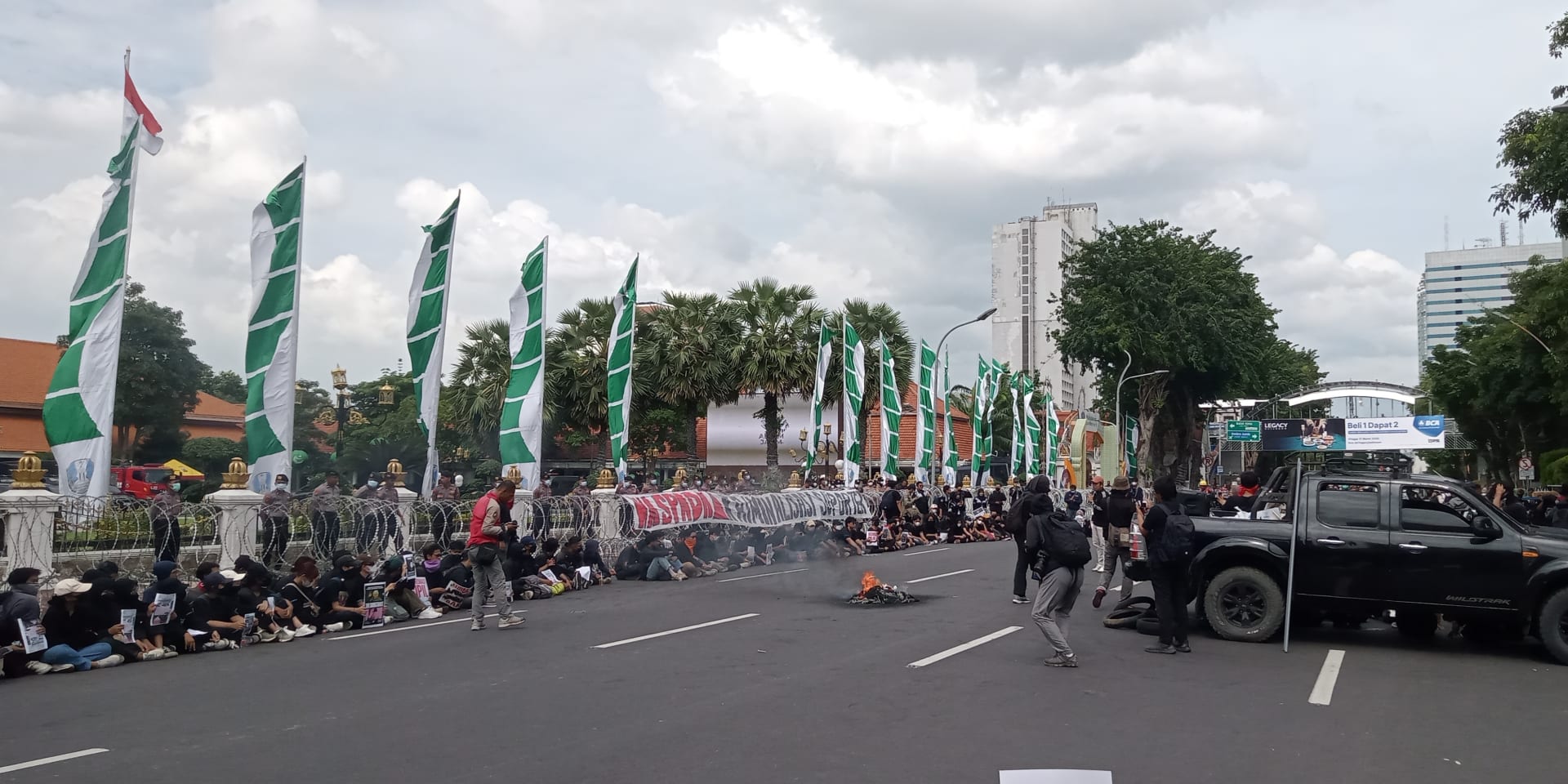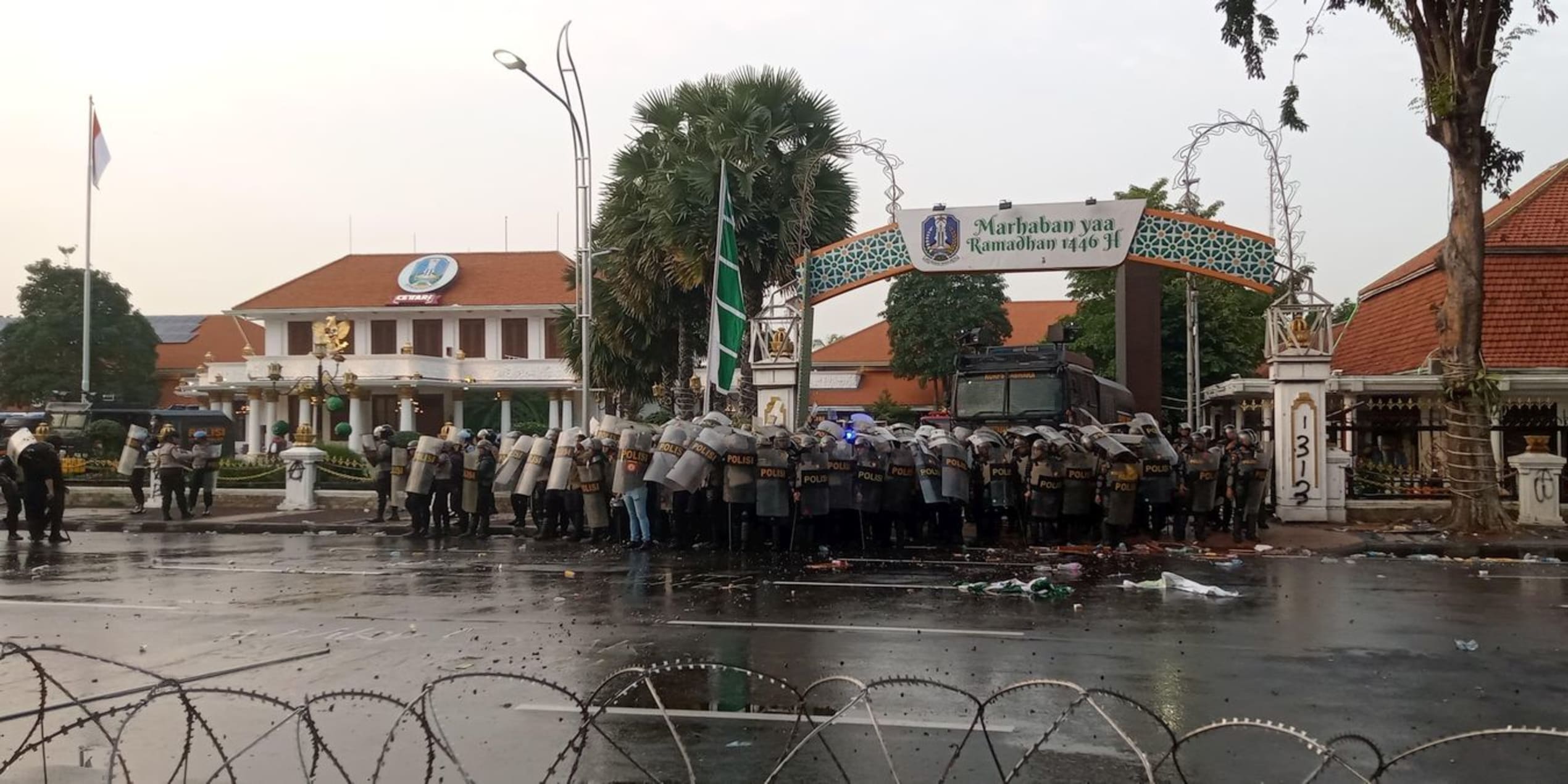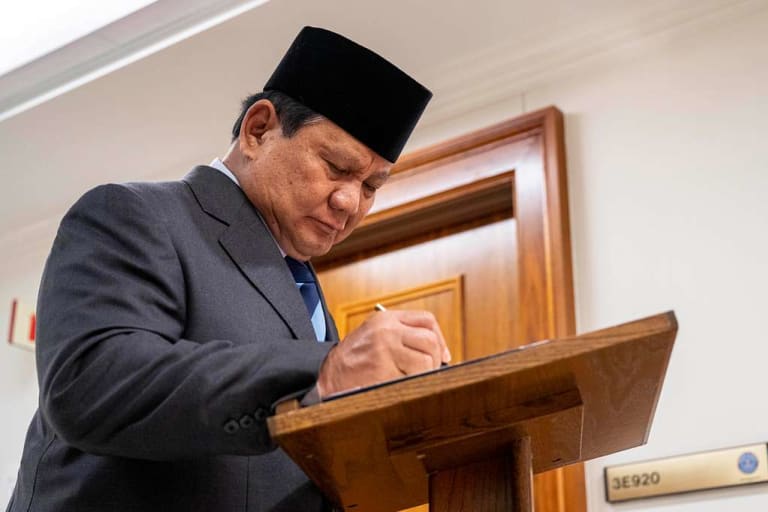Violent clashes between students and security forces
Student protests in Indonesia: ‘The fight for our future cannot wait’

© fotograaf is bekend bij de redactie

© fotograaf is bekend bij de redactie
Kasper Nollet
30 April 2025 • 13 minutes reading time
In late March, tens of thousands of students in Indonesia took to the streets to protest against the controversial army law reform. Critics say President Prabowo is eroding the rule of law and wants to curb press freedom. But a young generation of educated people is not simply acquiescing.
This article was translated from Dutch by kompreno, which provides high-quality, distraction-free journalism in five languages. Partner of the European Press Prize, kompreno curates top stories from 30+ sources across 15 European countries. Join here to support independent journalism.
Indonesia has been in turmoil in recent weeks due to ongoing protests against a reform of a law relating to the Indonesian National Armed Forces (TNI). The reform was approved by the House of Representatives in Jakarta on 20 March and allows senior army officers to combine up to as many as 15 civil service positions with their role in the army.
According to President Prabowo Subianto, the reform is necessary because of national security. He said tensions in the region, including between China and Taiwan, would call for more powers for the army.
‘The president’s record on human rights violations and the non-transparent manner in which the law has been implemented mainly confirm that Prabowo wants to expand his military power’, said Nadine Sherani, International Advocacy Officer at human rights organisation KontraS. Experts also fear the risks of the law, which puts pressure on the separation of powers.
The law change was not announced in advance and appeared on the legislative agenda on the sly. People’s representatives discussed the reform behind closed doors at a luxury hotel in capital Jakarta. When local CSOs denounced this, protests erupted on 20 March.
A collection of mostly students, CSOs and labour groups then protested under the banner #TolakRUUTNI (‘Reject the TNI bill’) for more than a week at more than 69 locations in just about every major province in the world’s fourth-largest country. It is a movement with no central leadership, organising from the bottom up and organically through social media – especially through X.
But the situation in Indonesia has been tense for some time, as protests have been taking place since Prabowo took office in October 2024. The biggest protest coincided with the inauguration of provincial governors on 20 February in front of the presidential palace in Jakarta.
Students took to the streets to demonstrate against, among other things, the new government’s austerity plans, which they said were neither fair nor well thought-out. The students called the protests ‘Indonesia Gelap’ or ‘Dark Indonesia’, a term that points to the problems the country is facing, but also capitalises on ‘Golden Indonesia’, the government’s aspiration to make the country a developed nation by 2045.
Police brutality
‘I was kicked and before I knew it, I tasted blood in my mouth’, Demi* is editor of the Indonesian Student Press Organisation (PPMI) and a communication studies student. On 27 March, despite him and his team immediately showing their official press cards, he was harshly detained.
‘Behind the doors of the House of Representatives, soldiers beat up me and my fellow students. We were then taken on a vehicle to a police station. There, we underwent similar treatment. The officers did not believe I was a journalist and they took photos of all the students’, he says. The student press in Indonesia has long been a victim of harassment.
Demi’s story is not an isolated case. The protests were dealt with firmly by the police and, much to the concern of the protesters, the army. Even though the protesters also provoked themselves, that approach was disproportionate, according to many observers. Human rights organisation KontraS speaks of dozens injured between 20 and 27 March. More than 150 protesters were arrested.
Ahmad* is a student at Brawijaya University and recently witnessed excessive police brutality in the Malang region. ‘I saw how a group of policemen raided a medical post that was partly manned by volunteers’, he says. ‘They caused destruction and intimidated everyone. It was totally unnecessary, but this kind of arbitrariness is unfortunately commonplace.’
Human rights organisation KontraS closely monitors the incidents and keeps a database of police brutality. ‘Several students were often detained for no valid reason. However, demonstrating is their right.’
Distrust of the police has been alive for some time. In 2022, 135 supporters were killed in a stampede at Kanjuruhan stadium after police unnecessarily deployed tear gas against enraged supporters. That tragedy became a national trauma. Amnesty International is therefore sounding the alarm over the years of violent crackdown by security forces.

© fotograaf is bekend bij de redactie
Free lunch
Indonesia has a specific history of militarisation, which explains the outrage over the renewed army law. During the presidency of notorious general Muhammad Suharto (1967-1998), the army’s entanglement with civilian government was even greater than today.
‘Suharto basically ruled as a dictator and held all the power’, says Sherani of KontraS. ‘His reign he himself called the “New Order” and was accompanied by excessive and unpunished violence against opposition and activists.’ He also ordered the abduction of activists, some of whom have never been found since 1998.
‘We don’t want to go back to that situation’, says Indonesian geography student Anissa*. ‘But Prabowo is pulling all the strings and is increasingly eroding the rule of law.’
A former commander of the Indonesian Special Forces, Prabowo is a very controversial figure suspected of human rights violations and war crimes during Suharto’s rule, among other things. Prabowo, incidentally, was the former president’s son-in-law.
Prabawo had already stood up twice in presidential elections, but it was only when he gained the support of his immensely popular predecessor and former rival Joko ‘Jokowi’ Widodo that he finally got elected in late 2024.
‘With a populist campaign that capitalised on the country’s economic problems and his image as a “strong man”, he scored a major victory’, points out Kris Vanslambrouck, Asia director of 11.11.11.
One of the spearheads of Prabowo’s campaign was offering free lunch in schools. Given the high poverty rates and inequality in the country, this was music to many people’s ears. ‘But to pay for that plan, he cut all kinds of public sectors, such as welfare and education. That came in hard’, says Vanslambrouck. Moreover, questions are being raised about the sustainability of the programme, and Prabowo is suspected of tampering in its outsourcing.
With his symbolic politics, the president was able to score with a young audience that has little clue about the country’s dictatorial history. Prabowo also cleverly campaigned on social media, marketing himself as a kind of ‘cute grandpa’. ‘This enabled him to win over low-educated and poorer social groups’, says Vanslambrouck. It is therefore not surprising that mostly educated students are leading the protests.
Prabowo’s right-wing nationalist Gerindra party has an almost absolute majority in the House of Representatives. ‘That large electoral weight has allowed him to win over almost all parties. Critics argue that some coalition partners are cooperating willy-nilly because Prabowo possesses incriminating material about them. This is especially the case with opposition party PDI-P.’
‘But the main motivation to cooperate still seems to be power participation’, Vanslambrouck said, ‘because that brings good business opportunities. There is a lot of corruption in Indonesian politics.’
Rule of law at risk
With a population of 280 million, Indonesia is officially the third-largest democracy in the world. Yet Human Rights Watch (HRW) points out that political and civil rights have been in decline for a decade. Andreas Harsono, a researcher at HRW since 2008 and author of several books on the subject, is deeply concerned.
‘Prabowo is breaking down the rule of law step by step’, says Harsono. ‘He started by continuing Jokowi’s parliamentary control and is now working further through bills such as the TNI Act. Protests he continues to call “foreign interference”, putting him on a par with that of Donald Trump and other so-called strongmen.’ Prabowo is therefore a great admirer of Trump.
‘The Supreme Court is also under pressure’, says Harsono. By law, presidential and vice-presidential candidates must be at least 40 years old to participate in elections. ‘But at the end of his term, Jokowi changed that law through that court so that his 36-year-old son could become vice-president. The chief justice, but also Jokowi’s brother-in-law, was demoted because of that controversial decision, and after fierce protests. But the damage was done.’
Journalist Erin Cook has been working for years as a correspondent for regional English-language media such as The Jakarta Globe and The Diplomat. According to her, a battle is raging internally in the legal community. ‘Some follow the government line to avoid conflict, others defend the independence of the judiciary’, she says. ‘Students have now appealed against the reformed TNI Act. How the court will deal with that will say a lot about what we can expect from the rest of Prabowo’s term.’
Prabowo is also tightening the reins on the economic front. ‘He has set up Danantara, an investment company to attract foreign funds. But it is completely under Prabowo’s control and not independently managed’, HRW’s Harsono warns. ‘And some of the biggest money also comes from state-owned banks.’
In addition, government construction projects increasingly encounter local resistance. ‘But when residents protest because of expropriation or environmental damage, the army increasingly intervenes’, says Sherani of KontraS. ‘That is a worrying development.’

Prabawo had already run twice in presidential elections, but only after he received the support of his hugely popular predecessor and former rival Joko “Jokowi” Widodo did he finally win election in late 2024.
© Itoldya (public domain)
Press freedom under pressure
Yet the protests barely get any coverage in the national media. According to journalist Erin Cook, the big media companies are under pressure. ‘When the Indonesia Gelap movement weakened at the end of February, Prabowo summoned all the chief editors of the major media’, she says. ‘What exactly was said there, we do not know, but it is clear that agreements were made.’
Although Cook says Indonesia has one of the freest press in Southeast Asia, large media groups run by oligarchs dominate the field. ‘A handful of independent media outlets, such as the influential weekly Tempo, do dare to report critically on the government.’
But even that medium gets a hard time. A few weeks ago, a Tempo journalist received an anonymous package containing dead rats and the head of a pig. ‘We don’t know who it came from, but this kind of harassment is increasing’, says Harsono of Human Rights Watch.
This makes the work of student journalists from the Indonesian Student Press Association (PPMI) all the more important, but also risky. Budi*, an English literature student, recounts how his and his colleagues’ cameras were snatched just like that when filming in Kediri. ‘Even with our official status, we are at risk. The arbitrariness of the police scares us and the government’s plans only make it worse.’
Fighting for the future
Due to the national leave after the end of Ramadan, the protests are now at a standstill, but Cook expects them to flare up again soon. ‘The January and February demonstrations attracted many people, but what was striking was the geographical spread. Protests took place not only in big cities, but also in smaller and even rural villages.’ Moreover, they are no longer carried only by students, which Cook says indicates growing dissatisfaction with Prabowo.
Andreas Harsono thinks the protests are also having an impact. ‘The stock market drop proves that. If the economy continues to fall, protests will also grow. The president cannot ignore that.’ The value of the Indonesian rupiah is also currently under great pressure, and is now even lower than during the 1997-98 Asian economic crisis.
However, controversial bills are still on the agenda: the reform of the police law that would give more power to law enforcement agencies, and an amendment to the cyber security law that would give security agencies more freedom to act against dissidents online. ‘A disaster for freedom of protest and expression’, Cook calls it.
‘It will get worse before it gets better’, says biology student Sari*. ‘But the fight for our future cannot wait. We don’t have five years, we want to be at the table now and influence the future of our country. We only have one country and we are not going anywhere else.’
*The students in this article testified anonymously as a precaution. Their names are known to the editors.
 This article was translated from Dutch by kompreno, which provides high-quality, distraction-free journalism in five languages. Partner of the European Press Prize, kompreno curates top stories from 30+ sources across 15 European countries. Join here to support independent journalism.
This article was translated from Dutch by kompreno, which provides high-quality, distraction-free journalism in five languages. Partner of the European Press Prize, kompreno curates top stories from 30+ sources across 15 European countries. Join here to support independent journalism.
The translation is AI-assisted. The original article remains the final version. Despite our efforts to ensure accuracy, some nuances of the original text may not be fully reproduced.
If you are proMO*...
Most of our work is published in Dutch, as a proMO* you will receive mainly Dutch content. That said we are constantly working to improve our translated work. You are always welcome to support us both as a proMO* or by supporting us with a donation. Want to know more? Contact us at promo@mo.be.
You help us grow and ensure that we can spread all our stories for free. You receive MO*Magazine and extra editions four times a year.
You are welcome at our events free of charge and have a chance to win free tickets for concerts, films, festivals and exhibitions.
You can enter into a dialogue with our journalists via a separate Facebook group.
Every month you receive a newsletter with a look behind the scenes.
You follow the authors and topics that interest you and you can keep the best articles for later.
Per month
€4,60
Pay monthly through domiciliation.
Meest gekozen
Per year
€60
Pay annually through domiciliation.
For a year
€65
Pay for one year.
Are you already proMO*
Then log in here